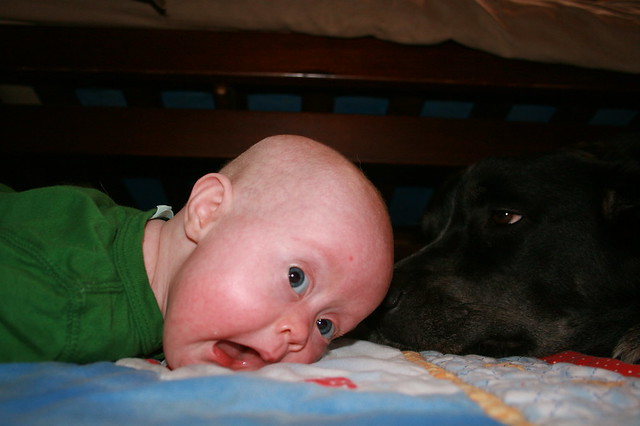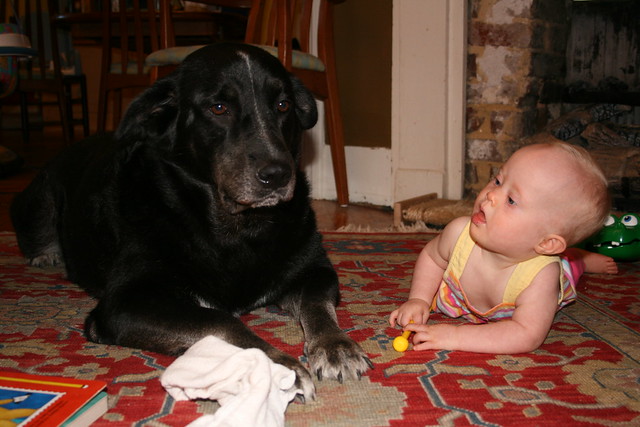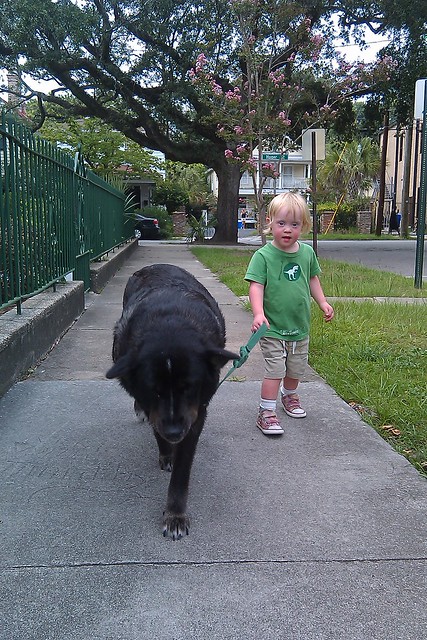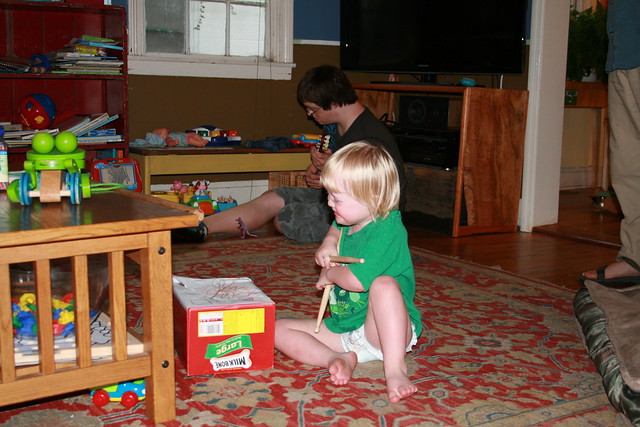This afternoon Biffle and I began the very odd process of becoming members of the UU congregation in Charleston. It's odd mainly because I'm considering joining a church. As we've discussed here before, we'd feel more comfortable if it had some sort of other title than "church"--cohort, gathering, cult, etc.
But we like it there, so we're moving forward. We want the official nametags. Today's meeting was mostly a get to know ourselves and each other kind of event. We all went into separate spots in the building and wrote about why we were there, and then we got together and shared. So I thought I'd share my thoughts with you--as I wrote them, I reflected, "This sounds like something on Baxter Sez."
WHY AM I HERE?
1. Because of Biffle. I would never have come on my own. I wasn't missing a religious community--in fact, I was/am pretty skeptical of religious communities because I see people who've been badly damaged by religion. Plus, much religion really chafes at my approach to the world.
2. Because of Maybelle. She loves it. Seeing how happy Maybelle is here was a big part of why I was willing to come back a second time. Plus, she was openly welcomed and included--not looked at in a pitying way at all. That would have been a deal-breaker.
3. Because of me and Biffle. I was surprised to find that church services are a space where we connect--sitting side by side, sometimes giggling at the hymns, sometimes getting surprisingly teary. We could have an ugly Sunday morning, but coming to church gives us a second start and a feeling of us-ness.
4. Because there seems to be no religion here. It's all vague, questioning, accepting, and I like that. I don't feel that I've necessarily learned anything being here, but I haven't been offended, and I do get the occasional nugget. Social justice seems to be quite central, and that's one of the central things in my life, too.
5. I'm not at all religious, but I'm open to spirituality--to the notion that I'm not the center of/the most powerful thing in the universe.
6. At a meeting over the summer, someone shared the joke that Unitarians are atheists who have children, and that resonated with me. But I don't come to the UU church because I want Maybelle to be "acceptable," to have an answer to the constant Southern question of "Where do you go to church?" I want her to be a radical activist and piss people off!* But I want our family to have a few different communities that support us all as valuable people in the world.
Thoughts that came up during the conversation: I had few friends and was widely ridiculed during my junior high years. It wasn't until high school that I met a crowd of artsy/nerdy/misfit friends who welcomed and embraced me. I've been sort of assuming that this is the nature of junior high--but today's conversation led me to think that Maybelle might not feel totally reviled in junior high if she has an artsy/nerdy/misfit bunch at the Unitarian church that she can hang with and go to camp with.
*One of the other couples there shared that their daughter discovered that the family of one of her friends won't let her hang out with them anymore because she "worships the Devil." My initial thought on hearing this story is that I hope Maybelle will roll her eyes and say, "Fuck you!" if someone ever says this to her. But then I remembered Cindi May's very good advice: we need to teach Maybelle to look sympathetic and concerned and say, "I'm sorry that you're so ignorant" when she hears things like that. Much more effective, plus you get to feel morally superior.
9.25.2011
Unitarian Universalists
9.21.2011
Sexual terrorism
I haven't taught my Gender and Violence class for a couple of years, so much of it feels new to me. Last night we were discussing an essay by Carole Sheffield called "Sexual Terrorism." Sheffield defines sexual terrorism as "a system by which males frighten and, by frightening, control and dominate females." She goes on to say that "women's lives are bounded by both the reality of pervasive sexual danger and the fear that reality engenders."
The statistics for violence against women are bad. Like, bad. Violence against women is incredibly pervasive. But what's even more pervasive is fear, or a consistent awareness among women of the need to make choices that will "keep them safe." (Please note that those are scare quotes from me.) Every time I've ever discussed this essay in class, I ask my students if they've experienced this low-level, pervasive fear. Every time, the hand of every woman in the class goes up. And that's what happened last night.
I asked them to tell me some examples. They had story after story:
- "I'm not sure if I'm just being weirdly paranoid, but I won't park in a parking garage unless I'm near an elevator."
- "Of course I won't ever leave the library alone after dark."
- "My friends told me about the bars that are roofies bars or Ambien bars, so I try not to ever go there."
- "I never let anyone I'm not really close to know where I live."
- "I heard a guy tell his girlfriend, 'I don't care what kind of self defense class a woman takes. If I wanted to rape her, she couldn't stop me.'"
- "I got catcalled in broad daylight by guys at a fraternity house, and every time I walk by there, I'm afraid. They felt okay yelling things at me during the day. What would they do if they saw me at night?"
At a certain point I had to stop the storytelling. I suspect we could have gone on for another hour, but class time was limited. I noticed that as they were telling their stories, many of them were laughing, as were folks in the class. There's a way in which humor is a defense mechanism: if we make it funny, it's not as scary. But I shared with them that I was listening not as their peer but as a professor, a mentor, and a parent, and I didn't find the stories funny at all. Those stories tell me about the world that we're living in, a world in which women consider it normal--even sensible--to spend much of their time afraid. And as a culture, we don't consider that a problem. We consider it just the way things are.
That is truly offensive and fucked up. Having been away from this conversation for two and a half years, I'd let my cynicism diminish. I wasn't calloused enough. I was wide open to the outrage that is the appropriate response to hearing a room full of valuable human beings tell you about the world they live in which encourages them to be afraid, but doesn't actually provide any meaningful protection from what they're afraid of.
9.13.2011
Benya/Bobo
Last Monday night, in the middle of the night, Benya died. It was unexpected, and we have every reason to believe that it was quick and not agonizing.
 We are pretty devastated. Benya was only four, and such a beloved, integral part of our family. We knew that big dogs have shorter lifespans, but we felt certain we had years ahead with Bobo. We've reflected on the extent to which the Bobo had to take a backseat after Maybelle came along. I guess this is what always happens when a child enters the family, but we both feel less than ideal about it. Biffle did some research and believes that Benya died from an adrenal gland issue that we might have caught if we'd been more attentive. She'd been increasingly inactive, but we just hadn't really hadn't taken the time to notice. The Bobo still seemed to take it all in stride.
We are pretty devastated. Benya was only four, and such a beloved, integral part of our family. We knew that big dogs have shorter lifespans, but we felt certain we had years ahead with Bobo. We've reflected on the extent to which the Bobo had to take a backseat after Maybelle came along. I guess this is what always happens when a child enters the family, but we both feel less than ideal about it. Biffle did some research and believes that Benya died from an adrenal gland issue that we might have caught if we'd been more attentive. She'd been increasingly inactive, but we just hadn't really hadn't taken the time to notice. The Bobo still seemed to take it all in stride.
 Benya had many talents: tolerance, a good attitude, and ferocity when needed. But let's talk about the Bobo's truly astonishing talent: she was the perfect dog for a home with a little kid. This was a talent that we didn't know about when we got her, because she was a year old before we had Maybelle. It turns out, though, that she had outstanding kid instincts. Protective instincts? Absolutely. But also caretaking instincts. When Maybelle was little, she'd try to feed Benya from her high chair. Benya wanted the food, but couldn't successfully get it out of Maybelle's offering fingers because she wouldn't use her teeth, and her lips were too floppy. She tried multiple times to use her lips to pry the piece of toast or Veggie Booty out of Maybelle's hands, but she couldn't do it, so I finally took it and put it in her mouth myself. Just last week, Maybelle tried to give Benya a Milkbone, but despite how much she desperately wanted the Milkbone, Benya wouldn't take it from her hands.
Benya had many talents: tolerance, a good attitude, and ferocity when needed. But let's talk about the Bobo's truly astonishing talent: she was the perfect dog for a home with a little kid. This was a talent that we didn't know about when we got her, because she was a year old before we had Maybelle. It turns out, though, that she had outstanding kid instincts. Protective instincts? Absolutely. But also caretaking instincts. When Maybelle was little, she'd try to feed Benya from her high chair. Benya wanted the food, but couldn't successfully get it out of Maybelle's offering fingers because she wouldn't use her teeth, and her lips were too floppy. She tried multiple times to use her lips to pry the piece of toast or Veggie Booty out of Maybelle's hands, but she couldn't do it, so I finally took it and put it in her mouth myself. Just last week, Maybelle tried to give Benya a Milkbone, but despite how much she desperately wanted the Milkbone, Benya wouldn't take it from her hands.
That's not due to any training we offered Benya. That was her own choice.
 She's been a central, and safe, part of Maybelle's life from the beginning. Bobo was Maybelle's first spoken word. She has offered every kind of unintentional abuse to Benya's body: falling on her, sitting on her, climbing up by pulling her fur, touching and identifying her eyes and nose and teeth. Bobo didn't mind. In recent months Maybelle decided that when we went for a walk, she was the one who'd get to hold Benya's leash. This also meant that when Maybelle stopped, she wanted Benya to stop, and when she started walking again, Benya was supposed to come along. Benya picked up on these requirements almost immediately and was an incredibly good sport.
She's been a central, and safe, part of Maybelle's life from the beginning. Bobo was Maybelle's first spoken word. She has offered every kind of unintentional abuse to Benya's body: falling on her, sitting on her, climbing up by pulling her fur, touching and identifying her eyes and nose and teeth. Bobo didn't mind. In recent months Maybelle decided that when we went for a walk, she was the one who'd get to hold Benya's leash. This also meant that when Maybelle stopped, she wanted Benya to stop, and when she started walking again, Benya was supposed to come along. Benya picked up on these requirements almost immediately and was an incredibly good sport.
Biffle has pointed out that due to a dog's short life span, a dog person is going to get to know a lot of dogs. All of them are special, but some of them are special-er than others. Bobo was certainly in that category.
9.11.2011
Singer and Lucas
I've had two requests for more info about my brilliant Lucas/Singer point of connection. Also, it's Sunday evening, and for various reasons I won't go into here, I'm not supposed to be doing any real work. So this is a perfect moment for me to share, briefly, how George Lucas and Peter Singer connect.
George Lucas: we all know who he is. He continues to ruin the Star Wars movies. For instance, in the BluRay release, when the Emperor is shooting lightning bolts at Luke, and Darth Vader picks the Emperor up and throws him into the pit, Darth Vader is screaming "Nooooo!" (It's as bad as you would think.) Here's what one of Trey's Twitter contacts said:
'88 George Lucas calls 2011 Lucas a "barbarian." 2011 Lucas just laughs & stuffs money in its neck pouch.Peter Singer is a super-famous philosopher at Princeton who has gotten famous from 1) being all over animal rights, and 2) saying that people with disabilities (particularly cognitive disabilities) are okay if you're in a family with one of them and you personally are all emotional, but our world would be better off without them. He keeps saying point #2, despite people (often those with disabilities) repeatedly pointing out how wrong and offensive this argument is, and how skewed and inaccurate his evidence is.
Singer, like Lucas, gets that pissing people off just creates more money for its neck pouch.
Update #1: Michael and Jamie Bérubé
Whew, folks, it's been a big several days since the last post.
The good news:
Michael and Jamie Bérubé were in town last week. They gave a talk Tuesday night to a packed, packed, standing room only crowd, with folks (me included) lingering out in the lobby, ears turned toward the open door, picking up a random word here and there. I was excited for multiple reasons:
- People on campus and in the community are interested in disability studies! They're eager, ready to know more, ready to consider how to make the world a better place for people who operate in lots of different ways.
- The people who came to the talk saw that this was popular. A buzz was created.
- Most important excitement: this interest and this buzz will directly benefit CofC's REACH Program, which I've said before, and I'll say again, is the leading program of its type nationally. And I am extremely excited to get to help promote and support such a great program.
Jamie gave a talk as part of Tuesday night's presentation--his very first lecture on a college campus! I didn't hear it because of the lobby situation I mentioned above, but once I watch the video, I'll weigh in. Let me say, though, that I'm a bit surprised that we're the first place that's invited him to speak. He often travels with his dad, and his dad is often talking about Jamie. If a university is interested in hearing Michael's thoughts about our society's view of Down syndrome in particular, and disability in general, why wouldn't they also be interested in hearing Jamie's thoughts?
Our audience seemed to love it.
9.05.2011
9.04.2011
Michael and Jamie Bérubé
I'm cooking up a blog post about gender and little kids, but that's going to have to hold off for a few days, because guess what's happening this week at the College of Charleston:
Michael and Jamie Bérubé are visiting!
I am picking them up at the airport this afternoon. Readers of the blog are probably aware of what a huge influence Michael's work, particularly Life as We Know It and this blog post were for me in the early months of Maybelle's life. Think of a metaphor: door opening, light switching on, orchestras in the background beginning a hopeful swell of music--that's sort of the effect. One of my students (very likely a reader of this blog) said to me on Friday afternoon, "I bet you're not going to sleep at all this weekend!" I have slept, but I woke up this morning with a jolt of adrenaline: they arrive today!



